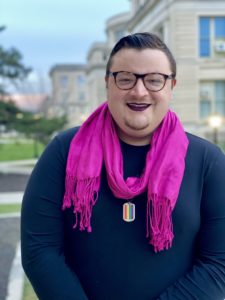
Alex Lange is a new assistant professor in the School of Education at Colorado State University. They pride themselves on having meaningful connections with their students, and have devoted much of their life to research aimed at helping fellow educators make college campuses a more inclusive environment for LGBTQ students. Learn more about why they came to CSU, and their methods and philosophies of teaching.
1. What brought you to the School of Education at CSU?
As a product of public university education, I am always drawn to institutions committed to serving the broader public. CSU’s history as a land grant institution means it has always been committed in some ways to the public good. I think this mission is exemplified in the School of Education! I have gotten to meet faculty colleagues and students dedicated to making education institutions better, more equitable places where all students can thrive.
2. What are your research interests, and how did you get interested in that topic?
I aim to help higher education professionals live up to their institutions’ missions of quality, inclusiveness, and transformation for all students, rather than some of them. To do this, I study minoritized college students and the social forces (e.g., practices, contexts, systems) that marginalize them. For the past three years, I have studied the college-going experiences of undergraduate transgender students. Now in its fourth year, I have sought to understand how transgender students enter, experience, and exit college. No study to date has followed the same cohort of transgender college students for this extended period. The project is projected to follow these students five years following their graduation to understand college’s short- and long-term effects on their lives. Additionally, I have kept in contact with students who have paused or altogether stopped their education, giving me comparative points to students who continued their education.
As both a member of the community and someone who works for other LGBTQ folks, my interests come from my lived experiences. I have worked within LGBTQ communities for the past decade, supporting students and young adults as they have navigated schools, colleges, and universities. Much of my research aims to help practitioners and educators use evidence-based practice to enrich LGBTQ students’ lives. In many ways, I am trying to provide people with data and evidence-based practices I wish I had when I worked full time!
3. What’s your teaching philosophy?
Teaching sustains my soul, reminding me of the infinite capacity of human beings! I view teaching as a process to equip students with higher-order thinking skills and translate that learning into practice. I teach to help students make meaning of their work, their students, and the world. To adequately make meaning, students need support from me as their instructor, both in and out of the classroom. I challenge students to grasp an author’s point of view while supporting the development of their points of view. To do this, I help students learn and process information through various modalities, like articles, book chapters, blog posts, podcasts, and videos. My ultimate goal as a teacher is that students learn.
As an instructor, I go into a semester with a thoughtful plan for engaging students through various topics related to the course outcomes. Though I engage in rigorous preparation, everything in my syllabus is tentative until I get to know the students in my class. Once I get to know my students, we build a learning environment together. In essence, I teach students to critically think about and apply the theoretical and practical knowledge gained in the classroom to structure campus environments in ways that meet various learning needs in equitable ways.
4. What’s your favorite thing about campus?
To be determined! I am working this fall semester remotely and will get to dig into all the goodness of campus in January!
The School of Education is part of CSU’s College of Health and Human Sciences.